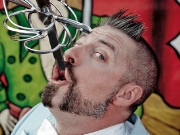As told to Cindy Rich
I was sweating bullets the first time I went into the room alone to talk to a family about organ donation. It was a small consultation room at a local hospital in 2008. Their loved-one had just died suddenly of a brain bleed. It was my job to talk to her family during the worst moment of their lives and convince them that something good could come out it. If I didn’t do my job well and make them understand how important donation is, then in a way other lives were in jeopardy. That’s a lot of pressure.
I’d trained for six months, observing other colleagues talking to families, and once I got more comfortable I would go into the room with someone else there as backup. This time I was on my own. I was thinking: This is completely up to me. Am I ready to do this?
I told them I worked with families every day that were in their situation, and I said I was there to talk about the next step. I asked, “Had she ever thought about being a donor?” I remember them looking at me like: Who are you? What are you asking us?
I explained how many lives she could save, and they seemed to come around very quickly. Most organ donors can save one to nine lives; tissue donation can enhance the lives of 50 to 100. They said they’d never considered donation—they were only thinking about funeral arrangements—but they knew it was something she would want to do. They were proud she could live on that way.
I say this a lot to families: “I’m not going to pretend I know anything about what you’re going through.” When we walk into that room, there’s nothing more that can be done for their loved one. A big part of our job is determining the best time to go in, but the reality is there is no good time.
We work 24-hour on-call shifts 10 to 13 times a month. It’s not really a job; it’s a lifestyle. Not all of my conversations with families go as well as that one did. But when you’ve been up all night and you find out that three or four people are alive because of something you helped facilitate, it’s pretty powerful.
Darden Sachs is manager of recovery services at the Washington Regional Transplant Community. She lives in Georgetown.
This article appears in the November 2011 issue of The Washingtonian.
















